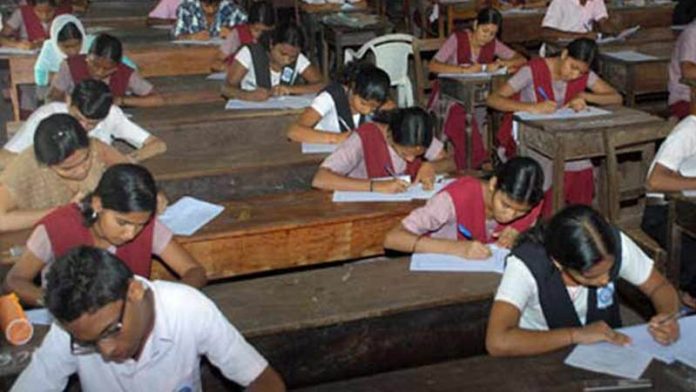About 10 lakh (1 million) out of 64 lakh (6.4 million) students failed to appear for their final board exams in 2018 in the largest Indian state, Uttar Pradesh, when its government decided to put an end to the rampant cheating culture in the state, according to The Hindustan Times. More than 70% of the students who did not appear for exams were from other states who had enrolled in the state exams to benefit from its ease of cheating – a business or practice commonly referred to as ‘suvidhaye.’
Suvidhaye for everyone
A place where education means obtaining qualifications at a price, cheating has become, over time, an industry. Students can obtain nearly full marks in their exams by paying Rs. 1,000 and even less at some places. Meanwhile, the price can go up to Rs. 8,000 in places like Allahabad where one can pass the exams without studying or appearing for them, says an article on Scroll.in.
The cheating ‘packages’ used include invigilators dictating answers, passing around answer paper slips and hiring someone else to fill up the answer sheet. These ‘packages’ reflect a variety of cheating service levels – a Rs. 5,000 cheating package allows students to write the exam using their own cheating resources; a Rs. 10,000 cheating package includes dictation of answers by invigilators, and the Rs. 15,000 package allows students to leave the exam hall after marking their attendance while the agents fill their answer sheets, according to an article in The Times of India.
Naturally, schools and institutions looking to profit from the menace started volunteering to be exam centers. The students who scored high in the exams served as advertisements for the schools to attract the next batch. The cheating mafia is inclusive – everyone from parents, teachers, invigilators, and the authorities is complicit.
The government steps up
Dinesh Sharma, deputy chief minister and in-charge of education in UP, with a mission to crack down on the outrageous use of unfair means in exams, conducted a meeting in July 2017 – for fair exams in 2018. The government resurrected the anti-copying law, first enacted in 1992, binding the supervisors and invigilators at exam centers to conduct exams by fair means, holding them responsible for cheating cases. Furthermore, the process of selection of exam centers was shifted online by the school board, the Uttar Pradesh Madhyamik Shiksha Parishad. The selection committee favored schools equipped with CCTV cameras with a capacity for 300 students. Out of 11,415 in 2017, only 8,549 schools were deemed good enough to be exam centers, according to Scroll.in.
Other prevention techniques comprised coded answer sheets and correction processes under CCTV surveillance. The security measures astounded the students who found no means of cheating in this new setup, leading to a bad result for the unprepared. Out those students appearing for the exams, only 14% passed.
The failing Indian education system
For a country to develop, an efficient and productive workforce is a requisite. Education plays a crucial role in the formation of a competent workforce, which brings forward the question of importance of quality education in a country. The Indian education system is a standard testing method that allots numbers to students that set a benchmark for their professional performance. It is a rat race among the population of students who are fortunate enough to receive education in the country.
The most popular education board, CBSE, boasts a long list of optional subjects for students to choose from, while most schools hardly offer more than six subjects from the list with little to no effort to encourage creativity and personal interests. The focus of teachers and parents is limited to what is relevant for exams and not the actual learning experience.
In addition, the extremely competitive college admissions and exams further promote the rat race to be better at memorizing instead of focusing on life-long learning. The limited options and ambitions of parents forced on students along with the standard testing method have produced a crowd of millions of young degree holders who lack the skill-set required in a professional environment.
The pressure asserted by parents and society for education (seen as a synonym or guarantee of financial security in life) has put additional pressure on students to score better. Inevitably, students resort to whatever means necessary to score highest in the standard tests even if it takes cheating to win this never-ending race.


















